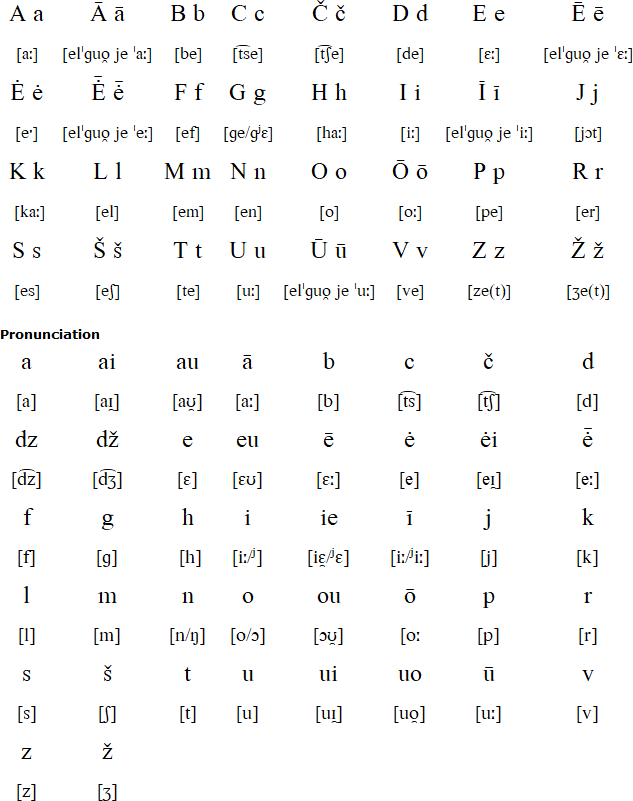Samogitian is an Eastern Baltic language spoken by 500,000 people in Tauragė, Telšiai and Klaipėda counties in the Samogitia (Žemaitija / Žemaitėjė) region in the west of Lithuania. It was considered a dialect of Lithuanian, however increasing numbers of people, including linguists, now consider it a separate language.
Samogitian is also known as Lowland Lithuanian, Zhemaitish, Žemaičiai, Žemaičių, Žemaitiškai or Žemaitis. Native speakers call it žemaitiu kalba, žemaitiu rokunda, žemaitiu šnekta or žemaitiu ruoda.
It is thought that the ancestors of the Samogitian people migrated to what is now Lithuania in the 5th century AD. At that time, the area was home to people who spoke Curonian, a Baltic language that went extinct in the 16th century. The peoples and languages mixed, and echoes of Curonian remain in Samogitian, especially in its pronunciation.
Samogitian first appeared in writing in the early 19th century in the Latin alphabet. One of the first literary works was a translation of the New Testament by Józef Arnulf Giedroyć, the Bishop of Samogitia, which was published in 1814.
There is a standard way to write Samogitian, however it is not widely used. Instead, writers tend to spell words according to their own pronunciation.

Download a Samogitian alphabet chart (Excel)
Details provided by Wolfram Siegel
Tievė mūsa, katros esi dongou,
Tebūn švėnts Tava vards,
Teatein Tava karalīstė,
Tebūn Tava valė
Kap dongou, tēp ė ont žemės.
Kasdėinėnės dounas douk mums šėndėin
Ėr atleisk mums mūsa kaltės
Kap ė mes atleidam sava kaltininkams
Ė neleisk mūsa gundītė,
Bet gelbiek mumis nu pėkta. Amėn
Information about Samogitian | Phrases | Numbers
Information about the Samogitian language
https://en.wikipedia.org/wiki/Samogitian_language
https://de.wikipedia.org/wiki/Schemaitisch
https://www.ethnologue.com/language/sgs
Samogitian phrasebook
https://wikitravel.org/en/Samogitian_phrasebook
Latgalian, Latvian, Lithuanian, Samogitian
Languages written with the Latin alphabet
Page created: 16.11.22. Last modified: 25.01.24
[top]
You can support this site by Buying Me A Coffee, and if you like what you see on this page, you can use the buttons below to share it with people you know.

If you like this site and find it useful, you can support it by making a donation via PayPal or Patreon, or by contributing in other ways. Omniglot is how I make my living.
Note: all links on this site to Amazon.com, Amazon.co.uk
and Amazon.fr
are affiliate links. This means I earn a commission if you click on any of them and buy something. So by clicking on these links you can help to support this site.
[top]